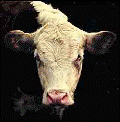Animal Science, Department of

Department of Animal Science: Dissertations, Theses, and Student Research
Date of this Version
5-2016
Document Type
Thesis
Abstract
Temperament in cattle can be described as the reactivity or fear response to human handling, and it is important to beef cattle producers not only from a human safety but also due to potential correlations with other economically traits. Before a docility selection metric can be added to a genetic evaluation, any potential antagonisms with economically relevant traits should be quantified. The objective was to estimate genetic parameters, including genetic correlations, for chute score (CS), weaning weight (WW), yearling weight (YW), and intramuscular fat percentage (IMF) in Hereford cattle. Single-trait and bivariate animal models were used to estimate heritabilities and genetic correlations. Models included fixed effects of sex and contemporary group, defined as herd–year–season. Direct genetic and residual components were included as random effects. For CS and WW, also additional random effects of maternal genetic and maternal permanent environment were fitted. For CS, WW, YW, and IMF, heritability estimates were 0.27 ± 0.02, 0.35 ± 0.03, 0.36 ± 0.02, and 0.27 ± 0.02, respectively. Genetic correlations between CS and WW, CS and YW, CS and IMF, WW and YW, WW and IMF, and YW and IMF were –0.12 ± 0.06, –0.10 ± 0.05, –0.08 ± 0.06, 0.47 ± 0.05, –0.19 ± 0.09, and –0.41 ± 0.05, respectively. Heritability estimates for all traits suggest that they would respond favorably to selection, although the selection for increased WW or YW could decrease marbling, which is often associated with favorable meat quality. Genetic correlations between CS and WW, YW, and IMF were all favorable but weak, suggesting that selection for improved docility will not have negative consequences on growth or meat quality. Maternal additive and maternal permanent environmental variances for CS were close to zero, suggesting that their inclusion in National Cattle Evaluations is not warranted.
Advisor: Matthew Spangler


Comments
A THESIS Presented to the Faculty of The Graduate College at the University of Nebraska In Partial Fulfillment of Requirements For the Degree of Master of Science, Major: Animal Science, Under the Supervision of Professor Matthew L. Spangler. Lincoln, Nebraska: May, 2016
Copyright © 2016 José Antonio Torres Vázquez